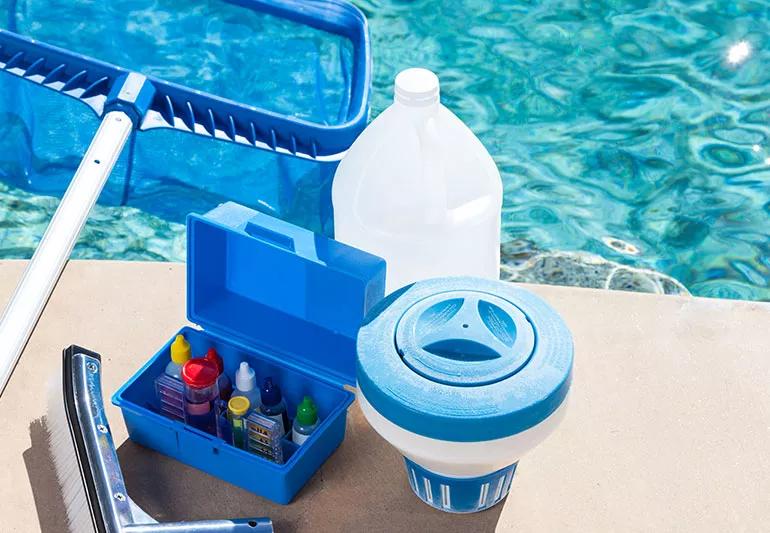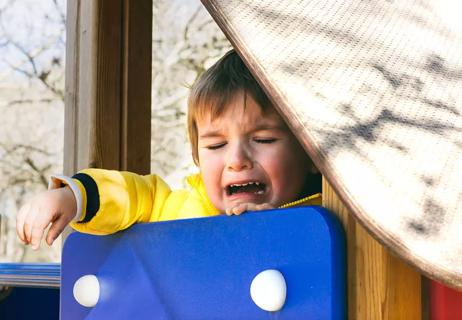Prevent irritation, illness and more by using pool chemicals the right way

Crystal clear swimming pools are often at the center of summer fun. And while we put a lot of emphasis on wearing sunscreen and preventing drowning during water activities, you probably don’t think about the chemicals that go into pools. Sure, you might be familiar with the smell of chlorine, but if the pool cleaning duties don’t fall on you, you’re probably not researching how pool chemicals could affect your health.
Advertisement
Cleveland Clinic is a non-profit academic medical center. Advertising on our site helps support our mission. We do not endorse non-Cleveland Clinic products or services. Policy
Pool chemicals like chlorine and bromine keep you safe from germs and bacteria. When used correctly, they help prevent outbreaks and other potential health problems. However, with recent shortages, many people have resorted to mixing things into pools that shouldn’t be. Other problems include mishandling or not storing pool chemicals correctly.
Emergency medicine physician Baruch Fertel, MD, offers some helpful tips for managing pool chemicals so you can stay safe whether you’re cleaning or enjoying the pool.
“It’s a great time of year,” says Dr. Fertel. “People have opened up their pools so their friends and family can cool off from the hot weather. However, everyone needs to maintain some basic safety rules when it comes to pool chemicals and equipment.”
The CDC refers to the chlorine and pH level of your pool as your “disinfection team.” These two elements serve as the first defense against germs that can cause illness. While chlorine is very effective, it doesn’t work instantly. And when things like dirt, skin cells, sunlight and even fecal matter end up in a pool, they can reduce chlorine levels.
The pH level determines how acidic or basic your pool water is. If the water has a high pH, it’s harder for chlorine to kill germs. Another thing to keep in mind is that your body can have a pH between 7.2 and 7.8. If pool water isn’t in this pH range, you’ll be able to tell because your skin and eyes will become irritated. To ensure this doesn’t happen to you or your guests, you’ll need to regularly check and adjust the chlorine and pH levels.
Advertisement
Dr. Fertel says that other common symptoms of irritation or illness include:
No, you shouldn’t be able to smell chlorine. According to the CDC, a well-maintained pool should not have a strong chemical smell. When you encounter that strong “chlorine smell,” you’re getting a whiff of what are known as “chloramines.” Chloramines are formed when things like sweat, urine, dirt, skin cells and even poop mix with chlorinated water.
After reading the last section, you probably don’t want to get into a public pool again. But there are things that you can do at home to prevent chloramines.
Dr. Fertel says there’s a right and wrong way to do it. When you think about it, it’s no different than adding detergent to a washing machine.
“When you’re adding chemicals to a pool, always add the powder to the water, not the water to the powder. When even a little bit of water gets on some pool chemicals, something called ‘wetting’ occurs. Chemical wetting can cause a dangerous reaction and combustibility. That’s why it’s really important to add pool chemicals to the water.”
You never want to store chemicals in a damp area. Dr. Fertel strongly recommends keeping them in a very dry space and away from any leaky containers.
“Pool chemicals should be stored in a dry area. Make sure that there are no other chemicals or items on the shelves above that could potentially drip down on them. The containers that the chemicals are in should also be sealed tightly.”
He adds that chemicals from different years should never be mixed. And if you’re using a specific device or container to pour the chemicals in, clean it thoroughly before the next use.
If you can’t find the pool chemicals that you need, mixing your own concoction is never the answer. According to the EPA, some common pool chemicals aren’t compatible with one another. Mixing these chemicals could cause a chemical reaction that could ignite combustible materials nearby or it can create highly toxic and corrosive chlorine gas.
“If you have a hard time finding the pool chemicals that you need, don’t resort to ‘homegrown brews’ or ‘homegrown mixtures.’ We know there are a lot of things that are in short supply right now. Pool chemicals are no exception. It’s important to use things that are safe and certified for use in a pool. It’s not the time to experiment.”
Advertisement
He adds that basic personal protective equipment like goggles and gloves are essential. If you’re using pool chemicals for a longer period, Dr. Fertel suggests using a face shield. And be sure to use these chemicals in a well-ventilated area.
Dr. Fertel says that most exposures to chemicals can be managed by just leaving the area. But when in doubt, seek medical help. And if someone ingests pool chemicals, contact your local poison control center immediately.
Advertisement
Learn more about our editorial process.
Advertisement

Breathing in toxic smoke can lead to serious health problems

Watch the weather, keep lines of communication open and make sure everyone on board has access to a personal lifejacket or flotation device

From bug bites and blisters to sunstroke and swimming safety, here’s how to stay well this season

From split lips to splinters, a little first aid can get your kiddo back on the swing set in no time

Breathing in unhealthy air can harm your lungs, heart and more

Establish rules and have a safety plan in place

As temperatures increase, so does the need for safety precautions

Make sure your wood has been split and stored for at least 6 months

Wearing a scarf, adjusting your outdoor activities and following your asthma treatment plan can help limit breathing problems

Your diet in the weeks, days and hours ahead of your race can power you to the finish line

When someone guilt trips you, they’re using emotionally manipulative behavior to try to get you to act a certain way